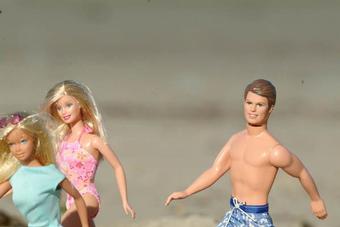 |
 |
||||||||
We Are Not Barbie When I was nine years old, and recuperating from a concussion after being thrown off a horse, I lay in bed and dreamed of Barbie. Pretty in Pink Barbie—I’d seen the commercials for weeks during Saturday morning cartoons. She was lovely, tan, slim, perky yet big-breasted, and adorned all in pink, of course. At nine, I knew I was kind of too old to play with dolls, but I was feeling horrible, and somehow Barbie represented all that was good and cheerful and right with the world.
“At least you’ll probably lose a few pounds,” they said consolingly, with a half-guilty smile. These are strong women, smart women, good women. They said it to cheer me up. And you know what? It did. Skinny is where it’s at. Even if it’s impossibly skinny. As feminists who criticize Mattel, Barbie’s creator, have pointed out, Barbie’s dimensions are impossible for a real woman to mimic. She’s been estimated to have a 39-inch bust, an 18-inch waist, and 33-inch hips. (Just try squeezing one of her teeny mini skirts over her hips. And I can guarantee from the number of naked Barbies strewn about my daughter’s room: she’s stacked.) To recreate her dimensions, a 125-pound woman would have tobe 7’2” tall. In response to the criticism, Mattel announced several years ago that it was thickening Barbie’s waist a bit, and giving her a bit of a breast reduction. (Is that why Ken broke up with her?) Still, Barbie is not fat. Her thighs don’t come close to touching. Her hair is long and full. Her large eyes, usually blue, are permanently made-up. Her feet remain suspended en pointe, ready as always to prance around in high heels, the better to make long legs look even longer. She may be just a doll, but womankind strives to be recreated in her image. For most Americans, tiny women represent something better. Thin-equals-self-control-equals-good. Fat-equals-lack-of-control-equals-bad. This wasn’t always so. Ann Bispo, a psychiatric nurse at Community Hospital of the Monterey Peninsula, runs a program called “Way of Life” that offers discussion groups for women and men to talk about body image. She says that the cult of thinness currently perpetuated by the media is only a fad. Bispo points to the various cultural ideals through history—from the Rubenesque woman whose weight (and, gasp! cellulite!) proved affluence, to women in the early 1900s having ribs removed, to flappers with boyish haircuts and wrapped breasts in the 1920s, to the voluptuous Marilyn Monroe ideal of the ‘50s, to tiny Twiggy in the ‘60s, athletic women in the ‘80s, and the heroin chic emaciated waif look of the ‘90s. “The [ideal] varies,” she says. “We have to look at, is it realistic to have to run out and change how we look every five years?” It definitely can feel that way. Magazines as varied as US Weekly, Good Housekeeping, Health, Self, People—almost any magazine that women might read—constantly proclaim across their covers that they’ve found the magic bullet. “Never Diet Again,” or “Sexy New Diet Secrets! Hollywood’s Latest Ways to Get Thin Fast!” And if the magazines aren’t telling us how to lose weight, they’re profiling others who lost it. “Jessica Simpson: 4 Sizes Skinnier!” blared recent headlines, with images of the formerly voluptuous pop star in a bikini with her ribs poking out of her skin. And, “Lindsay Lohan Lost 20 Pounds!” with before-and-after shots of the 18-year-old singer/actress. Now that celebrities Simpson (who is starting to look a lot more like Barbie) and Lohan have joined the thin club, pop culture has lost some of its only stars known for their healthy curves. And these chicks are flaunting it. Lohan was recently photographed wearing a tank top that said, “Skinny Bitch.” . . . . . . . . . . . . . . . . . . . . . . . . . . . . . . . . . . . . . . . . . We carry her image with us. The Barbie doll woman resides in our mind’s eye, ruining a good workout or an excursion to the beach. The healthy joy quickly drains of out a trip to the gym when we are secretly watching ourselves in the mirror as we stride on the elliptical trainer. There she is, the woman in the reflection, compared instantly to the woman in our minds. And if we are somehow able to resist carrying around that “perfect woman” in our heads, the remarks of other gym-goers do the trick. “Ugh, I haven’t worked out all week, I probably gained ten pounds.” “Are you kidding? Look how fat my stomach is.” Going out to eat is likewise ruined by Ms. Barbie. Shouldn’t we be fasting, not eating carbs, skipping sugar and flour, perhaps having our stomachs stapled? Flip on the tube, and it’s more of the same. Women are being perversely created into something completely artificial. On The Swan, “ugly” women become beautiful with the help of personal trainers, and lots and lots of plastic surgery. And hair extensions. And makeovers. And a new wardrobe. And… Bispo says that it’s almost impossible to avoid getting sucked in to body obsession, but we still need to resist. “It’s crazy-making if we buy into it,” she says. “But we have to say, ‘Wait a minute, how about being the healthiest you, whatever that is. We all have tendencies to be a certain shape. Rather than being at the whim of whatever is in fashion, we emphasize feeling healthy and happy.” At the heart of that proposition lies the question, who are we wasting all this time obsessing about our bodies for? Men? That seems too easy. Most men I know are gracefully oblivious to the weight issue—within limits. (Bispo does note that she treats some men with body image issues.) So why is it so important that we take up less space? “The messages come from the media and family,” Bispo says. “It’s pretty tragic how much influence there is. But the most powerful thing for our kids is what they hear and see at home. We need to look at the craziness of these expectations throughout time and kind of rebel against them. “Our body is our package,” Bispo says. “It’s not our soul and our essence, or who we are as people.” I was really mad at my mom for not getting me Pretty in Pink Barbie. Maybe it’s time to let her go. Articles reprinted courtesy of Monterey
County Weekly |
Bad News for Local Women |
|||
 Now, at age thirty-three, I lie in bed with the stomach
flu, searching for a silver lining to the illness. And what rings through
my head are the words of my contemporaries.
Now, at age thirty-three, I lie in bed with the stomach
flu, searching for a silver lining to the illness. And what rings through
my head are the words of my contemporaries.